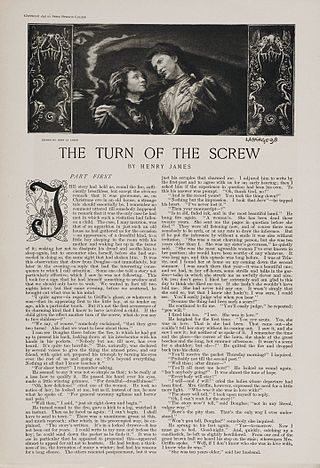
The Turn of the Screw is an 1898 horror novella by Henry James which first appeared in serial format in Collier's Weekly. In October 1898, it was collected in The Two Magics, published by Macmillan in New York City and Heinemann in London. The novella follows a governess who, caring for two children at a remote estate, becomes convinced that the grounds are haunted. The Turn of the Screw is considered a work of both Gothic and horror fiction.

The Innocents is a 1961 British gothic psychological horror film directed and produced by Jack Clayton, and starring Deborah Kerr, Michael Redgrave, and Megs Jenkins. Based on the 1898 novella The Turn of the Screw by the American novelist Henry James, the screenplay was adapted by William Archibald and Truman Capote, who used Archibald's own 1950 stage play—also titled The Innocents—as a primary source text. Its plot follows a governess who watches over two children and comes to fear that their large estate is haunted by ghosts and that the children are being possessed.
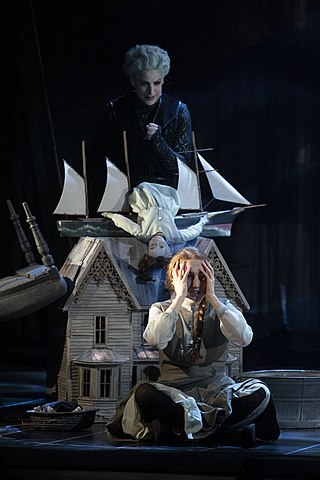
The Turn of the Screw is a 20th-century English chamber opera composed by Benjamin Britten with a libretto by Myfanwy Piper, "wife of the artist John Piper, who had been a friend of the composer since 1935 and had provided designs for several of the operas". The libretto is based on the 1898 novella The Turn of the Screw by Henry James. The opera was commissioned by the Venice Biennale and given its world premiere on 14 September 1954, at the Teatro La Fenice, Venice. The original recording was made during January of the next year, with the composer conducting.

Muguette Mary "Megs" Jenkins was an English character actress who appeared in British films and television programmes.

A Woman Called Golda is a 1982 American made-for-television film biopic of Israeli Prime Minister Golda Meir directed by Alan Gibson and starring Ingrid Bergman. It also features Ned Beatty, Franklin Cover, Judy Davis, Anne Jackson, Robert Loggia, Leonard Nimoy, and Jack Thompson.

In a Dark Place is a 2006 horror film version of Henry James' 1898 novella The Turn of the Screw.
James Costigan was an American television actor and Emmy Award-winning television screenwriter. His writing credits include the television movies Eleanor and Franklin and Love Among the Ruins.

The Nightcomers is a 1971 British horror film directed by Michael Winner and starring Marlon Brando, Stephanie Beacham, Thora Hird, Harry Andrews and Anna Palk. It is a prequel to Henry James' 1898 novella The Turn of the Screw, which had already been adapted into the 1961 film The Innocents. The manor house in the film is Sawston Hall, a 16th-century Tudor manor house in Sawston, Cambridgeshire.
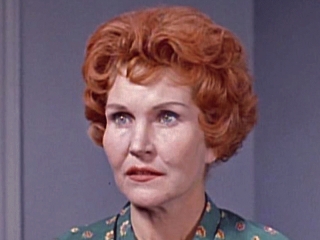
Startime is an anthology show of drama, comedy, and variety, and was one of the first American television shows broadcast in color. The program was aired Tuesday nights in the United States on the NBC network in the 1959–60 season.

The Turn of the Screw is a British television film based on Henry James's 1898 ghost story of the same name. Commissioned and produced by the BBC, it was first broadcast on 30 December 2009, on BBC One. The novella was adapted for the screen by Sandy Welch, and the film was directed by Tim Fywell. Although generally true to the tone and story of James's work, the film is set in the 1920s—in contrast to the original 1840s setting—and accentuates sexual elements that some theorists have identified in the novella. The film's story is told in flashbacks during consultations between the institutionalised Ann and Dr Fisher. Ann tells how she was hired by an aristocrat to care for the orphans Miles and Flora. She is met at the children's home, Bly, by Mrs Grose, the housekeeper. Ann soon begins to see unknown figures around the manor, and seeks an explanation.
The Innocents is a play written by William Archibald that premiered on Broadway in 1950 and was revived in 1976. The play is based on the 1898 novella The Turn of the Screw by Henry James.
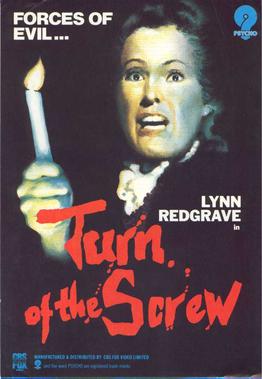
The Turn of the Screw is a 1974 American made-for-television horror film directed by Dan Curtis based on the 1898 novella of the same name by Henry James. The film aired on ABC on April 15, 1974.

The Turning is a 2020 American gothic supernatural horror film directed by Floria Sigismondi and written by Carey W. Hayes and Chad Hayes. It is a modern adaptation of the 1898 ghost story The Turn of the Screw by Henry James. It stars Mackenzie Davis, Finn Wolfhard, Brooklynn Prince, and Joely Richardson, and follows a young governess in 1994 who is hired to watch over two children after their parents are killed.
The Haunting of Helen Walker is a 1995 TV film based on 1898 novella The Turn of the Screw by Henry James.

The Haunting of Bly Manor is an American gothic romance drama miniseries created by Mike Flanagan, and released on October 9, 2020 by Netflix. The second entry in Flanagan's The Haunting anthology series, it mostly acts as an adaptation of the 1898 novella The Turn of the Screw by Henry James, but also includes other elements either based on James' other works or created for the show. It features much of Hill House's crew and some of the same cast, such as Victoria Pedretti, Oliver Jackson-Cohen, Amelia Eve, T'Nia Miller, Rahul Kohli, Tahirah Sharif, Amelie Bea Smith, Benjamin Evan Ainsworth, and Henry Thomas. Though Pedretti, Jackson-Cohen and Thomas returned from Hill House as different characters, as did Kate Siegel, Carla Gugino, and Catherine Parker in recurring roles; the two series' narratives are not connected.

"Little Moon of Alban" was an American television play broadcast by NBC on March 24, 1958, as part of the television series, Hallmark Hall of Fame. It was written by James Costigan, directed by George Schaefer, and starred Julie Harris and Christopher Plummer.
The 1959 Sylvania Television Awards were presented on January 21, 1960, at the Plaza Hotel in New York City. The Sylvania Awards were established by Sylvania Electric Products.
"All the King's Men" was an American television play broadcast in two parts by NBC on May 14 and 21, 1958, as part of the television series, Kraft Television Theatre. It was written by Don Mankiewicz based on the 1946 novel by Robert Penn Warren. Sidney Lumet was the director, and the cast was led by Neville Brand as Willie Stark and Maureen Stapleton as Sadie Burke.
Alexandra Wager is an American former child actress.
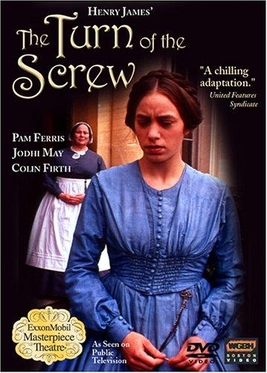
The Turn of the Screw is a 1999 television film based on the 1898 novel The Turn of the Screw by Henry James. The production starred Colin Firth as the Master, Jodhi May as the governess 'Miss' and Pam Ferris as Mrs Grose. The 138 minute film was made for the American series Masterpiece Theatre, a drama anthology television series produced by WGBH Boston, and was directed by Ben Bolt. The score was composed by Adrian Johnston while the screenplay was written by Nick Dear.














